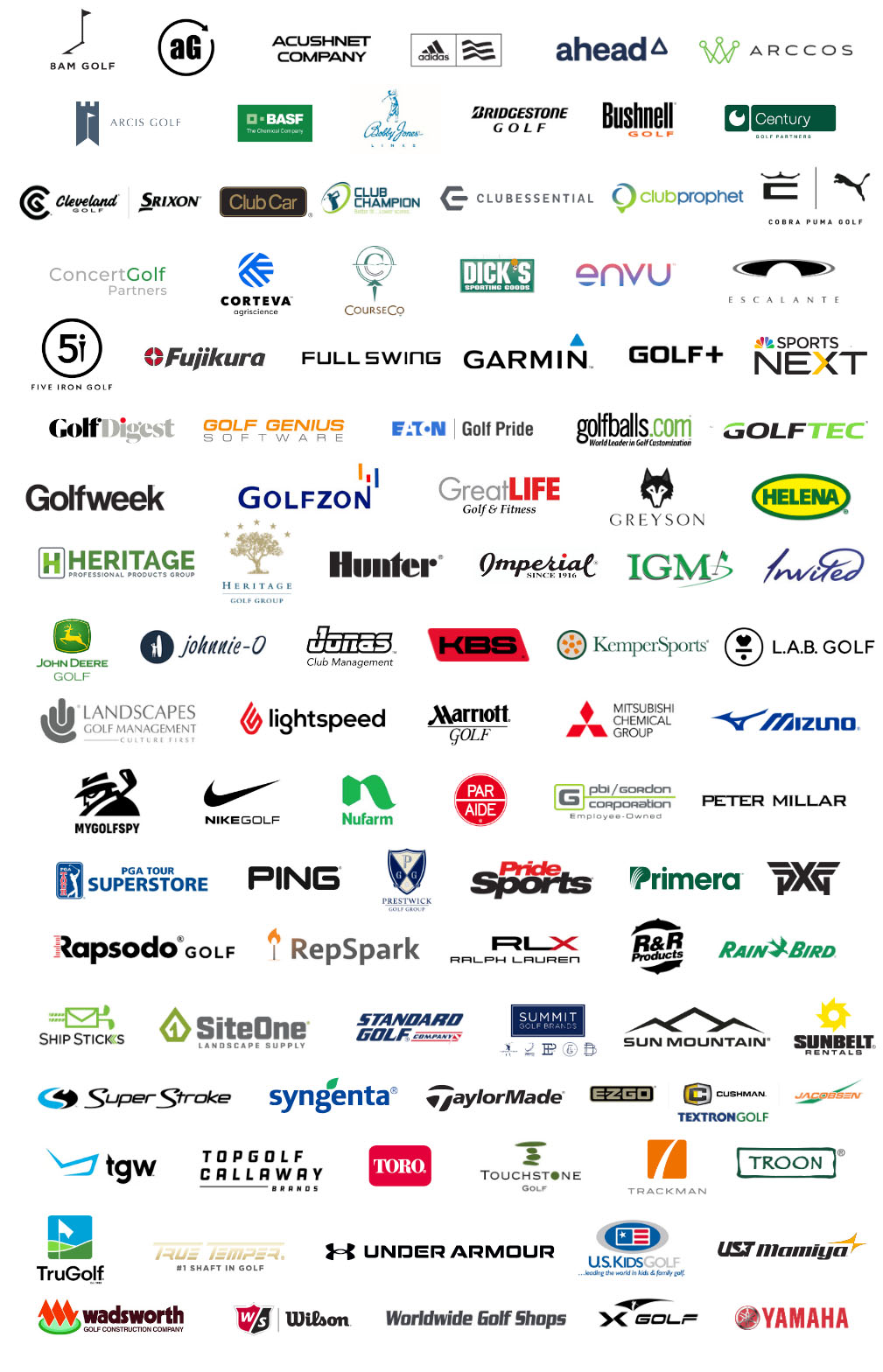The following are the businesses included in the latest version of the NGF GOLF 100, an effort to highlight the vitality, size and diversity of a $102 billion-a-year industry. This is an alphabetical list, not a ranking, of companies and brands that deliver products and services primarily targeted to commercial golf and conduct all or a majority of their business within the U.S. Find an issue with a company profile? Whether it’s information, staffing or logo that needs to be updated, please contact our editorial director, Erik Matuszewski, at erikm@ngf.org.
About the NGF Top 100
The NGF’s Top 100 Businesses in Golf is a biennial list created to recognize the most successful, prominent, influential, successful and innovative companies in the U.S. golf industry. The initiative’s focus is on companies and brands that deliver products and services primarily targeted to recreational golf.
The NGF GOLF 100 is a list – not a ranking – that is broken down by sectors and celebrates the sport’s vitality, size and depth. The diverse list of companies contains not only the well-known brands that golfers see on TV, but highlights the innovators and influencers throughout various business segments that contribute to a game that has an annual economic impact of over $100 billion in the U.S.
Candidates were evaluated on seven weighted criteria, among them financial success, growth rate and trajectory. Other assessments included influence throughout the golf industry, innovations, prominence and leadership within a particular category, and contributions to the growth and vitality of the game.
While professional golf tours and major associations are unquestionably big businesses in their own right – from the PGA TOUR and LPGA to PGA of America and USGA – associations and organizations are recognized separately from the GOLF 100 to provide greater focus on businesses and brands that sell products or services geared toward the commercial or recreational side of golf. This also applies to agencies and prominent business partners and sponsors of major tours that are active and invested stakeholders in the game.
Golf may be particularly unique in the number of different companies that contribute to its economy; perhaps no other sport has such a broad array of businesses tied to the recreational side of a game played by tens of millions.
The Top 100 Businesses in Golf is NGF’s recognition of that depth and vitality.
The equipment industry is the most commercially visible sector in the golf business, with a host of household brands that produce the clubs and balls found in the golf bags of millions of recreational players around the world. Many of them also pay big money for endorsement deals with top professionals, hoping to further enhance their recognition and appeal.
The equipment category for clubs and balls alone is more than a $5 billion annual market, but also extends to club components such as shafts and grips.
Based on wholesale equipment dollars, golf is among the largest recreation sports in the United States, trailing only camping and fishing. More money is spent every year on new clubs and balls than on equipment for sports like basketball, baseball and football combined. Thus, it perhaps comes as little surprise that the equipment sector, with 17 companies, is one of most heavily represented segments of the Top 100 Businesses in Golf. And several others (Titleist and Callaway) fall in the Portfolio Company category because they’re central to a bigger umbrella business alongside several other brands.
The course management side of the golf business continues to grow, as the number of U.S. golf courses working with third-party management companies or aligning with owner-operators has increased from almost 11% in 2010 to nearly 16% today.
There are more than 200 companies with at least two golf facilities under management and about two-thirds of those manage or own/operate five facilities or fewer. Together, these businesses have almost 2,100 properties under management, including 10 with 40 or more courses in their portfolio.
In total, 15 companies hold spots among the Top 100 Businesses in Golf. This includes third-party management companies like Troon, KemperSports and CourseCo; owner-operators such as Arcis, Concert and Escalante; a hybrid of the two like Invited; and businesses with course landscaping management interests (IMG) or a combination of facility operations and development (Landscapes Unlimited).
The apparel & accessories sector in golf is diverse, ranging from companies that sell shoes, socks, polo shirts and outerwear to those that manufacture hats, gloves, sunglasses, golf bags and travel gear.
Given the recent rise in athleisure and golf’s positioning as a lifestyle sport in general, more businesses than ever are venturing into the apparel industry side of the game, expanding the scope and diversity of offerings within the sector. As anyone who has attended the annual PGA Merchandise Show can attest, a growing range of companies specialize in golf apparel or have a dedicated golf division or line.
Even so, some clothing or shoe brands that are Top 100-worthy in their own right won’t specifically be found in this category as they fall under the umbrella of a bigger parent company in equipment or elsewhere; think names like FootJoy (Acushnet), TravisMathew (Topgolf Callaway) or Puma (Cobra). The Apparel & Accessories sector features 12 representatives among the Top 100 Businesses in Golf.
As the traditional game of golf evolves rapidly, the media & technology sector continues to get larger and more diverse.
The range of products, goods, technology, and software in this category is geared toward helping recreational golfers play better and improve their experience, engage with the game more both on and off the course, and aid operators in running their facilities, pro shops and tee sheets with greater efficiency.
There are rangefinders, indoor simulators, shot trackers and industry-leading app providers. There are national commercial simulator chains and a company (Golf+) that’s pioneering virtual reality golf games.
There is software for both club management and event management, including one that’s used at almost two-thirds of golf courses in the U.S.
There is also representation from a variety of media properties creating popular golf content across a broad spectrum of platforms.
The landscape in golf’s retail market has seen significant change over the past couple decades, much like the rest of the industry itself.
The most successful companies in the space adapted during a time when recent market consolidation prompted a decline in the overall number of off-course golf retail locations.
E-commerce continues to grow — in golf and beyond — as online convenience influences the way consumers are purchasing products. Many traditional brick and mortar stores now have a robust online presence, in addition to embracing a broader experiential, technical position. This means locations where consumers can swing clubs and get real data and feedback relative to the performance of a given product. Meanwhile, specialty club-fitters and online retailers (including a secondary market) have become more prevalent as another option for golf’s most avid participants.
In total, seven U.S.-based golf retail companies – some of which feature sub-brands or have interests beyond traditional retail (such as instruction or fitting) – are represented among the Top 100 Businesses in Golf. DICKS’s owns and operates a variety of retailers, including Golf Galaxy, while Worldwide Golf in 2024 merged with annother former Top 100 company in Global Golf.
The turf and course suppliers category might not have the most well-known companies within the Top 100 Businesses in Golf (with the possible exception of golf car manufacturers), but the businesses and brands in this B2B sector help golf courses look their best, operate efficiently and, ultimately, keep customers happy by improving the game’s most important product: the golf course.
On the turf side, this includes companies that make and sell mowers and maintenance equipment, irrigation technology, and the fungicides, herbicides, insecticides and growth regulators to keep courses healthy and green. And then there are the nationwide distributors for many of the chemicals required by course superintendents and their crews.
On the facility supplies side, it’s the biggest golf car businesses and companies that make all the other essentials a course needs to operate: from bunker rakes, cups and flags to tee markers, stakes and ball-washers.
A strictly business-to-facility (B2F) category, turf and course supplies is a deep and diverse mix, with 22 businesses included in the Top 100.
In an effort to properly categorize a number of diverse, far-reaching businesses with a range of products and services, we’ve opted to characterize this segment as portfolio companies — meaning they have a variety of prominent brands under a broad umbrella.
Perhaps the most notable examples are Acushnet, the holding company that includes two of the game’s most well-known brands in FootJoy and Titleist, and Topgolf Callaway Brands Corp., which has positioned itself as a tech-enabled modern golf and active lifestyle company.
In coming years, several other established companies could end up in this category as well due to acquisitions of other brands in the industry.
GreatLIFE and Brown joined forces, but remain firmly entrenched in the Management category, while the same can be said in other categories for paired businesses like Peter Millar and G-Fore (Apparel), Bushnell and Foresight (Technology), and ENVU and FMC (Turf & Course Supplies).
The golf landscape is diverse indeed, necessitating a catch-all miscellaneous category for those businesses that don’t necessarily fall into a specific bucket.
Some essentially created their own niche within the industry or have become a standout in their own unique part of the broader golf business.
(The below organizations, associations, non-endemic businesses and more are heavily involved in the business of golf, with many inextricably tied to the game's past and future. These categories, for now, are not eligible for inclusion among the Top 100 Businesses in Golf.)
Some of the well-known associations in golf may be the most noteworthy ‘businesses’ of them all – whether that’s making money, growing the game, influencing the industry, or all of the above.
There certainly aren’t many organizations with more clout in the sport than the professional tours, which make millions of dollars from corporate sponsorships and television deals while also activating player-development and charitable efforts, and championing vital diversity & inclusivity initiatives.
Other noteworthy trade associations in this category provide vital education, information and advocacy to their nationwide, and often global, membership — from golf course owners and architects to superintendents and teaching professionals.
First Tee, meanwhile, is more than a player development program; it’s about providing youth with educational programs that build character, instill life lessons and promote healthy choices – all through the game of golf.
As in the previous iteration of the intiative, associations have been excluded from the Top 100 Businesses in Golf in order to put a greater focus on businesses with products or services for the recreational game. But here are 10 of golf’s most noteworthy associations/organizations:
- PGA TOUR
- PGA of America
- United States Golf Association
- Ladies Professional Golf Association (LPGA)
- First Tee
- American Junior Golf Association (AJGA)
- American Society of Golf Course Architects (ASGCA)
- Golf Course Superintendents Association of America (GCSAA)
- National Golf Course Owners Association (NGCOA)
- Club Managers Association of America (CMAA)
From management and representation to marketing, branding, promotion, consulting, event communication and more, there are numerous agencies that have a significant footprint in the golf industry. Here are a handful or so of particularly notable business agencies:
- IMG
- Octagon
- CAA
- GSE
- Wasserman
- Buffalo Groupe
From tournaments and tours to organizations and players, golf is a game well-suited to corporate sponsorship.
The demographics of the typical golf fan reflect a highly desirable audience and the game’s total reach represents more than one-third of the U.S. population. Golf works well for companies that deal in both the business-to-business and consumer space and want to advance charitable causes in the local community. Corporate sponsors get more than an image boost by associating with the Tour’s charities, too, they get incremental national media exposure. Here are ten of the game’s most significant business partners:
- Rolex
- FedEx
- Charles Schwab
- Mastercard
- BMW
- Zurich
- Travelers
- American Express
- Sentry
- AT&T
Whether its golf destinations, destination golf resorts or destination golf in general, this niche continues to grow in popularity – particularly on the public side as golfers seek special getaway experiences. Golf travel is tied to approximately 40% of the game’s overall economic impact and is currently bigger business than ever.
Bandon Dunes ushered in the world of off-the-beaten-path destination golf when it opened on a remote stretch of Oregon coast in 1999. At the time, questions about its viability outnumbered accolades.
Bandon Dunes broke the mold in numerous ways, among them: links golf in the U.S., no golf carts or cart paths, saving the best waterfront property for golf instead of a clubhouse. Today, Bandon Dunes is one of the game’s most desired golf destinations and helped give rise to a brand known as Dream Golf, which is also involved in golf resorts such as Sand Valley (Wisconsin), Rodeo Dunes (Colorado), Wild Spring Dunes (Texas), and Old Shores (Florida).
In addition to Dream Golf, other top golf resort and destination brands include:
- Boyne Golf
- Kohler Golf
- Pebble Beach Resorts
- Pinehurst Resorts
- The Cabot Collection
Subscribe to receive 3-minute insights... free!
Thousands of members rely on the NGF.
But don’t take our word for it.
Need Help?
Answers to the most frequently asked questions about the NGF and the benefits of membership.

Monika “Moe” Baldwin
(561) 354-1617

Madison Myers
(561) 354-1632
















